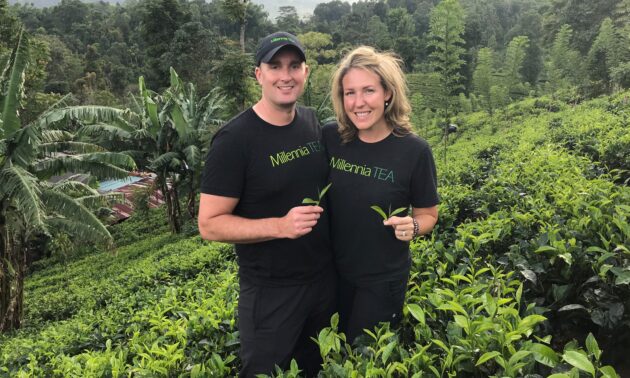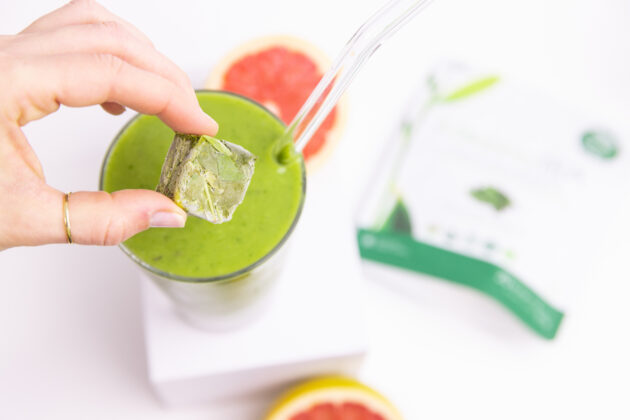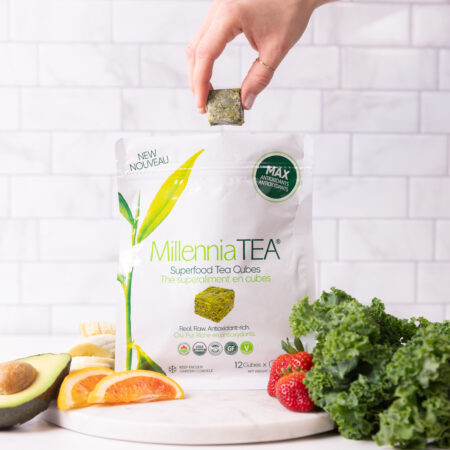
Frozen, not dried: The Bells create a new tea category
By Monica Ferguson
Food Trends Beverages Health & Wellness Editor pick Millennia Tea New BrunswickAward-winning Millennia Tea inspires consumers to switch from bags to frozen cubes for healthy doses of tea
 Rory and Tracy Bell. Photos © Millennia Tea
Rory and Tracy Bell. Photos © Millennia Tea Tea is the second most popular beverage on earth, only after water. Tea, the Camellia sinensis plant to be exact, has been around for thousands of years with roots as a medicinal beverage.
In 2016, Rory and Tracy Bell, founders of Millennia Tea, had a health scare in their family. They began to consider how food can be used to naturally prevent and reverse damage and disease. The health concern brought them to question what functional nutrition is and how food can play a role in helping people live longer and healthier. This moment in time was the impetus that sent the Bells on a journey, which eventually morphed into Millennia Tea.

Millennia Tea’s Superfood Tea Cubes are flash frozen the same day and minimally processed
to retain the tea’s nutrients.
Doing the groundwork
With an aspiration to use food as medicine, the duo began researching. Based in New Brunswick, neither of the Bells had previous experience in the tea or food business; Tracy was working as the head of public affairs for a provincial emergency medical services organization and Rory is a pilot.
“We did a deep dive into tea,” said Tracy. “Green tea and matcha kept coming up for their ability to help protect cells from disease. We learned that the tea plant, if you pick and consume it in full form, is the most powerful and purest version of tea.”
All black tea, green tea and matcha comes from the same plant: Camellia sinensis. The Bells zeroed in on one specific antioxidant in tea, EGCG (epigallocatechin gallate), which is said to be effective at neutralizing free radicals and protecting cells. University of Kansas research found EGCG is 100 times more effective than vitamin C and 25 times more than vitamin E at protecting cell’s DNA from damage by free radicals.
“We went looking for tea suppliers and tea farmers who could provide us with real raw tea without drying [mainly] for the health of our family, and not because we wanted to start a business. We wanted food as medicine, literally,” said Tracy.
Bemused that they couldn’t find this sort of fresh tea in North America, the couple devoted three years to researching, sourcing, and travelling to tea-producing countries to find a way to preserve this mighty medicinal plant in its purest form.
They spent time in the fields with farmers in Kenya, travelled to the rainforest in Colombia and sourced from China and Hawaii amongst other countries.
During their travels, they partnered with small-scale family farms and worked and lived with them, learning how they processed the leaves. Tracy recalled harvesters plucking and eating the leaves straight from the plants, which “was a really fun moment for us because that was our whole hypothesis. If you consume the leaf in full, it is really good for energy, immunity and inflammation, all of which tea is associated with.”
Not yet satisfied with the final product, they travelled to Sri Lanka as industry friends suggested the Camellia sinensis there naturally produces high antioxidants, thanks to the altitude, geography, and growing conditions.

Millennia Tea cubes straight from the package.
The process
Eventually, the couple found the tea plant they were looking for in the mountains of central Sri Lanka, 8000 ft above sea level. The Bells have now partnered with organic certified and fair-trade farmers at Marginalized Organic Producers Association (MOPA) who harvest the leaves. The leaves are then taken to a BRC-certified facility in Sri Lanka itself.
“What we learned, tested, outsourced third-party lab work for and then went on to get patents for, is a process to maximize the antioxidant content in the tea leaf,” said Tracy.
Tracy remembers the moment she made the decision. They had done their research and collected the first samples.
“The day we got the results of the analyses we knew we had something special, something that could help families like ours have more good time with their loved ones. That week I gave my notice to fully dive into making this dream a reality,” she recalled.
It was exactly two years later, in 2019, that Millennia Tea’s first product, Superfood Tea Cubes, was ready for market. In February 2020, weeks before the pandemic hit, they had their first scalable product, which could reach a large consumer base.
“What we do is really simple. We pick the same beautiful organic tea leaves used for quality loose leaf green tea. But after the plant is picked, we do the opposite of every conventional tea company out there,” she explained.
EGCG properties degrade with exposure to heat, light, and air, which is how all dried teas are processed to ensure they are shelf stable.
“We treat the tea plant as organic produce. We wash and flash freeze the plant on the day it is harvested. We keep it in its real raw form to try and give that fresh-from-the-field experience and give the tea plant new uses as a functional ingredient to promote health,” Tracy explained.
The entire process happens in Sri Lanka. The leaves are plucked, taken to the MOPA plant, and then packaged into individual frozen cubes. The frozen cubes stay fresh for up to 36 months in the freezer and can be enjoyed by steeping into a tea (which can be reused multiple times as the antioxidant count goes up on the second infusion), tossing into a smoothie, or adding extra nutrients to cooking or baking.
The leaves and stems are both encouraged to be eaten. The stems are said to contain an even higher level of L-theanine than the leaves. L-theanine is an amino acid that is supposed to help ease anxiety and promote clarity, good sleep, and brain function.
Commercializing their idea was challenging since the Bells were working with small-scale organic family farmers in remote places on the other side of the globe.
“It took time to build trust, and lots of experimentation, and really capable partners both here and at home, as well as at source, to bring it all together and create a consistent and scalable product,” said Tracy.
The duo bootstrapped the product during the many years of R&D and product development. They sold what they could sell and invested savings to get Millennia Tea off the ground.
“Once we had a really compelling product that delivered on the promise to help people scientifically, along with compelling early consumer feedback, and felt we had de-risked the business model as much as possible, we partnered with external shareholders.”
Today, they have a mix of angel investors and institutional partners, including Natural Products Canada, and a couple of specialized U.S. venture capital funds.
Millennia Tea can now be found in grocery stores across the country, including Real Canadian Superstore, Sobeys, Whole Foods and, most recently, Healthy Planet.
What’s next
Looking to the future, the brand will continue to support the areas where they are already doing business while also actively exploring opportunities to be an ingredient in other products, such as smoothies and kombucha, thereby expanding their reach and making their tea more accessible to a broader consumer base.
Millennia Tea is currently pilot testing with local companies, including New Brunswick-based kombucha company, Tea of Life, and a smoothie shop in St. Andrews, N.B.
“We are looking beyond having a brand on a shelf, and how we can be an ingredient that boosts the nutritional value of already existing consumer products,” said Tracy. “The reason we exist as a company is to help people live better longer. We have a product that quite literally can help people with feeling better while supporting their long-term wellness. We want to be able to be as accessible and get this into the hands of as many people as possible.”
They are also developing a new unfrozen product that will act like a freeze-dried powder, identical in appearance to matcha, addressing the need for a convenient, on-the-go option for consumers.
By reintroducing tea in its purest form, Millennia Tea is changing the way we perceive tea and its potential to promote health and longevity.
This article was originally published in the August/September 2023 issue of Food in Canada.
Print this page